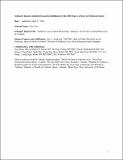| dc.description.abstract | Purpose: Palliative care education is rare in low- and middle-income countries. In Vietnam, a Rapid Situation Analysis in 2006 showed a high prevalence of pain and other types of suffering among HIV/AIDS and cancer patients, limited access to pain medications, and a lack of training for physicians in pain control and palliative care. This study measured the Knowledge, Attitudes, and Practices (KAP) of Vietnamese physicians at palliative care training courses between 2007 and 2014 to inform and evaluate training efforts.
Methods: In collaboration with the Ministry of Health and Vietnamese hospitals, we developed basic and advanced Continuing Medical Education (CME) curricula in palliative care. We also designed an accompanying KAP survey that asks participants about demographics (including clinical area and experience prescribing opioids), self-assessment, attitudes, and a knowledge test. The basic curriculum was taught at five-day training courses at hospitals and medical schools throughout Vietnam. Participants filled out the survey at the beginning and end of each conference, and data from a total of 392 physicians was analyzed. Descriptive statistics were conducted to summarize data, and relationships between KAP scores and demographic variables were analyzed.
Results: Physicians had a mean score of 44/100% on the knowledge test, revealing knowledge gaps in the management of non-pain physical symptoms and of psychological symptoms such as depression and delirium. 85% of physicians agreed that most cancer patients die in pain, and over 70 percent agreed that morphine unavailability and cost contribute to the under-treatment of pain, with a higher proportion of physicians working in HIV/AIDS care reporting these concerns than in oncology. Participants felt that they lacked adequate training in palliative care and pain treatment topics. Prior experience prescribing opioids, in particular oral morphine, was significantly associated with higher levels of knowledge, more appropriate attitudes toward palliative care topics, and higher self-rated understanding.
Conclusions: Our results indicate that Vietnamese physicians recognize the need for palliative care, identifying a high burden of untreated pain, and that concerns about cost and availability of morphine may be more prevalent among HIV/AIDS providers. Increasing access to opioids is necessary along with expanded education, and these efforts are likely to be mutually reinforcing. | |


